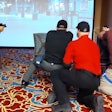So you're beginning your career in law enforcement and you want to position yourself now for the future. You wish to become a chief, sheriff, captain, or detective. But how do you prepare yourself today for that career that is 15 years down the road? Simple; today's planning will set your future's career path.
Once you start as a new officer or deputy it is easy to become so wrapped up in the profession and your lifestyle that you stray from your career goals. You may go to a specialized unit or start a family; and pretty soon the days become a routine and the months and years slip by you.
The completion of your college degree is put off for off-duty jobs. One day you read the bulletin board and see the sergeant's test is next month. What can you do to prepare for it? Nothing much, and it is too late for now. This scenario happens daily across the nation, but there is a way to avoid it: planning.
Goal Setting
Ask yourself, Where do I want to be 10 years or 20 years from now? Do I want to be a sergeant, captain, chief, detective, or in the private sector? Research your dream job now so you'll know the appropriate steps needed to land the position.
If your goal is to make captain in your respective department before you retire, obtain the job description, its requirements, and recent job announcements for every rank up to and including captain. From there, start making a list of the department's requirements in the areas of training, years of service, and other desirable traits. List other requirements such as traditional academic requirements; some departments require an associate or bachelor's degree for promotion.
Create a timeline of where you are today and a projection of time before you can apply for another particular rank. This will give you time to achieve a particular goal for this pay rank, or maybe even get ahead for the next as well.
Start a File
One essential project you have to produce in time for promotion is a comprehensive file, including your training records, letters of achievement, and other similar laudatory letters. You are solely responsible for your personal records. You cannot trust your life's work to others. And there's no time like the present for taking on such an important project.
I recommend that you immediately purchase a sturdy, if not fireproof, safe and keep it in a secure place. In it, maintain a filing system of all important records and certifications.
Later in your career when you apply for a promotion or a job with another agency you will need proof that these files actually do exist and you have not fluffed your résumé. You should not entrust your department or the state to archive your files; some file clerk may not find them as important as you do. If you keep copious records, every line on your résumé can be validated should its contents be challenged. Simply go to your files and prove your facts with documentation. It is your credibility on the line. Additionally, I would suggest that you copy these to a computer disk for additional records or for ease of sending copies via e-mail.
Academic Pursuits
Have you achieved your diploma yet? If not, explore all of your options. Check out local and online universities and the financial aid they can offer you. Does your agency provide an educational tuition assistance program for employees? If you are a military veteran, contact your VA office and see if you have any Veterans Educational Assistance money remaining. Do your homework; the money you are saving here is yours. Do not forget to also investigate your options with online education, for this is a viable alternative today.
Law Enforcement Training
This is where we need to have a frank discussion. Many officers believe the simple key to success is "training, training, and more training." But while training is certainly helpful and a noble pursuit in itself, it won't necessarily help you land the title you want. To do so training needs to be applicable to the position's job duties.
Answer the following question. Are you seeking a career in upper management, a specific career path (detective, accident investigator), or a post-retirement career (insurance investigator or consultant in a specific field)? Once you decide on your pathway, you can make a plan of attack. You may need to focus on an area of expertise. If you decide to seek a managerial goal, it's probably best to take generalist courses to establish a base foundation of knowledge. Then after that has been achieved, focus on supervisory courses.
One flaw of law enforcement is its failure to provide officers with quality career counseling. We all had this in high school and college, but not in this career field. Seek out a mentor or a trusted supervisor, one who is familiar with your agency, the training available to you, and the internal requirements for promotions. He or she can advise you what training is valued by the promotion boards.
If you wish to pursue a specialized career-say that of a detective, accident investigator, or the like-then your training path is simplified because it will be much narrower. If your goal is to become an investigator, pursue training with an investigative slant. All specialized training events, expos, and conferences offered in this discipline will enhance your areas of expertise.
Joining professional associations is especially beneficial when pursuing a job in a particular area of expertise. For instance, if your state has a state homicide investigators association, seek membership in the organization and attend state-specific training. Training through a local association will not only increase your base of knowledge, but the networking opportunities available through attending group events could prove invaluable. Also be sure to stay on top of new techniques and key issues in the specialization that interests you by reading relevant publications.
Second Career
Should your plans extend beyond the 20-year mark, they'll likely involve a post-retirement career. This is a real option that many do not plan for until it is too late. But there is real money to be netted out there beyond law enforcement.
Some of you may not want anything to do with police work after you hang up your spurs. Others may wish to continue on and apply your life's learning to another vocation. Both choices require pre-planning and pre-positioning.
One hapless officer who received a job offer post-retirement had never assembled any of his life's work. He had a limited time to respond to the offer and there was absolutely no way he could gather up his résumé, passport, and other necessary documents in this time frame. Try he did, but to no avail. I did feel sorry for the man. If he had pre-planned and assembled at least some of his paperwork, he probably would have gotten that dream job. Learn from the lessons of others.
If you are positioning yourself for a second career in a police-related field, be realistic in your goals. Your life experience and lack thereof will factor into your success in the realworld job market.
For instance, I know of an officer who applied for the job of accident reconstructionist with an insurance company. He had all the proper certifications, schools, and 20-plus years on the job. However, he had never worked as an accident investigator. In the business world, companies will be seeking real-life application with professional life experience. An officer who had routinely investigated fatalities would have better met this company's needs.[PAGEBREAK]
Challenges and Assignments
In your career you will be faced with "mandatory opportunities to excel." In other words, your supervisors will position you to maximize your potential. Even if you might not want to, when you're presented with an opportunity, take it. This is your chance to prove your worth.
The Field Training Officer (FTO) program is the best example of such an opportunity. Your life is good and then the sergeant comes in and "offers" you the FTO school. You think, This is a fairly hard school. Who wants to be an FTO? You'd have to train and put up with rookies. You enjoy your freedom and solo status. And this new position would mean extra work. Stop and think. Being an FTO is considered a one-on-one supervisor; this looks good for promotion.
Instructor school is the same; it is difficult. You have to work hard to research and prepare your lesson plans. But it looks good on your record, for an instructor is a leader in the classroom. Fulfilling this role proves you have public speaking skills. So, if you have an opportunity to attend, go. There may be other assignments or opportunities to excel that come your way. Seize the opportunity to show that you are up to the challenge.
Upon looking back at my career, I gave up a few choice assignments for a few tough ones that later positioned me for even better ones. My mentor chief told me, "Never get comfortable in a job, for if you do, you are not learning." Sage words of advice. He called me one day at my office and asked me on the telephone if I was comfortable and I replied that I was. I was transferred after lunch. Years later I now thank him a great deal for that.
Promotional Exams, Assessment Centers and Oral Boards
There are as many promotional processes as there are agencies. I will not even venture to say which one is best, fairest, or most adaptive to police work; there are no right answers. Some agencies have civil service boards, some use promotional points schemes, some may still use seniority.
The first step is to fully acquaint yourself with the process your department uses. Some progressive departments provide training for the promotional process. If this is offered to you, take it. Ask fellow officers who have gone through the process before for their insight. This is not insider information or cheating. Go to the academy or the local university and research the type of promotional process you are facing. Libraries, book stores, and the Internet are full of information on these processes. Also, your departmental supervisor or mentor should give you valuable insights. Take full advantage of every tactical edge you can get on this process.
I have some test preparation tips that have served me well. Set up a study timeline and study daily. In other words, do not cram! Most oral boards or written exams are policy and procedure based. Your department only has a few hundred or so, right? Start at the time of the announcement and study throughout the entire time. The key here is to pace yourself. (Besides, you should already know most of these anyway). If there is a suggested reading list, read it. They did not give you the list for recreation purposes.
Now, this is very important. For an oral board, do not go in cold. Practice some personality performance-based questions. For example, imagine telling the board of a time that you failed and how you overcame this failure, or explaining an instance when you observed a problem and how you handled it. Have a friend test you with these types of questions or others to prepare you for the pressures of oral boards. I repeat, never enter an oral board for the first time cold.
No Guarantees
You may fulfill all of the academic requirements and take all the training and assignments you can. But you still have to keep your house in order. Your personal conduct, evaluations, and internal investigation all have to be within boundaries.
Before you scream, "Not fair!" listen to me. You have got to do your job and do it within legal, ethical, and
moral boundaries. You do that, fine. If you go out and live a colorful lifestyle you can expect it to cloud the promotional process. In a large city where there is great autonomy, maybe not. In a small- or medium-sized agency, expect it. That's life. Some media or citizens will not forget, so be careful. Do your job, but do it right.
Also find out if your agency is still under any consent decrees for past promotional practices. You can be the best and brightest with all of the promotional points, but if the decree is still in effect, you may not get the promotion. And that's just how it goes.
If you don't get promoted right away, don't stomp around and say ill things. You never know who is watching you. How you handle adversity in your life is how you are judged. Take your lumps, go to the promotion ceremony, and congratulate the victor. Go on with life. How you heal will exhibit how well you can handle the stress of command. Being dysfunctional will prove that you were not the right choice.
Demonstrate maturity and integrity and follow a focused plan to reach the next rank. Your time will come and I'll be able to say, "Congratulations, Sergeant!"
















